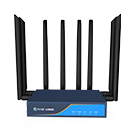Προωθημένο
Industrial Router The Backbone of Modern Industrial Connectivity

In today’s rapidly evolving world of automation and smart manufacturing, connectivity plays a crucial role in maintaining efficiency, safety, and productivity. The industrial router has become a vital component of modern industrial networks — providing secure, reliable, and high-speed data communication across complex environments. Whether it’s a factory floor, an energy plant, or a transportation hub, the industrial router ensures seamless communication between machines, sensors, and control systems.
Unlike standard home or office routers, an industrial router is engineered for extreme conditions, such as high temperatures, dust, humidity, and electromagnetic interference. It’s built to deliver robust and stable performance where regular routers would fail. Let’s explore what makes industrial routers so important, how they function, and why they’re transforming the way industries operate.
What Is an Industrial Router?
An industrial router is a networking device designed specifically for industrial environments to provide secure data transmission between industrial equipment and control centers. These routers support both wired and wireless communication technologies such as Ethernet, 4G LTE, 5G, and Wi-Fi.
Their main purpose is to connect different machines and systems — often known as Industrial Internet of Things (IIoT) devices — so they can share data in real-time. This enables remote monitoring, predictive maintenance, and automation, which ultimately leads to higher efficiency and lower operational costs.
Unlike consumer routers, an industrial router includes rugged hardware, enhanced cybersecurity, and advanced management features that make it ideal for continuous operation in harsh environments.
Key Features of an Industrial Router
An industrial router stands out due to its unique combination of strength, durability, and intelligence. Here are the essential features that make it indispensable for industrial applications:
1. Rugged Construction
Industrial routers are built to withstand tough environments. They can operate in wide temperature ranges — often from -40°C to +75°C — and resist dust, moisture, and vibration. This durability ensures uninterrupted performance even in challenging conditions like manufacturing plants, oil rigs, or outdoor installations.
2. Reliable Connectivity
These routers support multiple communication options such as 4G LTE, 5G, Ethernet, and Wi-Fi, ensuring constant connectivity even when one network fails. Redundant SIM slots and failover features guarantee continuous operation — a critical aspect for industrial systems that can’t afford downtime.
3. Advanced Security
In industrial environments, cybersecurity is a top priority. An industrial router includes VPN support, firewalls, encryption protocols, and intrusion prevention systems to protect sensitive data from cyberattacks. With remote monitoring and cloud management, network administrators can identify and fix vulnerabilities before they cause harm.
4. Remote Management and Monitoring
Industrial routers allow centralized management from anywhere through cloud-based platforms or web interfaces. Engineers can update firmware, configure settings, or troubleshoot issues remotely — saving time, money, and effort.
5. Flexible Interfaces
These routers often come with multiple ports — serial, Ethernet, and digital I/O — making it easy to connect to various types of industrial devices like PLCs (Programmable Logic Controllers), sensors, and cameras.
6. High-Speed Data Transmission
Modern industrial routers support high-speed connections that enable real-time data transmission. This allows operators to monitor processes instantly and make informed decisions quickly.
Applications of Industrial Routers
The cellular router is used across a wide range of industries where connectivity and reliability are mission-critical. Here are some of the most common applications:
1. Smart Manufacturing (Industry 4.0)
In modern factories, industrial routers connect machines, sensors, and control systems, enabling seamless automation. Real-time data exchange between devices helps manufacturers monitor performance, detect issues early, and optimize production efficiency.
2. Energy and Utilities
In power plants and renewable energy systems, industrial routers help monitor equipment such as turbines, transformers, and solar panels. They transmit critical data to control centers to ensure smooth operation and prevent costly breakdowns.
3. Transportation and Logistics
From fleet management to intelligent traffic systems, industrial routers play a key role in ensuring reliable data transmission. In logistics, they enable GPS tracking, route optimization, and communication between vehicles and control rooms.
4. Oil and Gas Industry
In remote and hazardous locations like oil rigs and pipelines, connectivity is essential for safety and monitoring. Industrial routers provide secure communication for sensors and control systems, helping detect leaks, pressure changes, and other potential hazards in real time.
5. Smart Cities and Infrastructure
Industrial routers are the backbone of smart city infrastructure — supporting applications such as surveillance systems, environmental monitoring, public Wi-Fi, and intelligent lighting. Their reliability ensures consistent operation across large networks.
6. Retail and Banking
Even in sectors like retail and banking, industrial routers ensure uninterrupted connectivity for ATMs, digital kiosks, and POS systems. With secure VPN capabilities, these routers protect financial data and prevent unauthorized access.
Benefits of Using an Industrial Router
Investing in an industrial router brings several benefits for businesses that rely on strong, secure, and stable communication systems:
-
Enhanced Productivity: Reliable connectivity ensures smooth operations, reducing downtime and delays.
-
Cost Efficiency: Remote monitoring and maintenance eliminate the need for frequent on-site visits.
-
Improved Safety: Real-time alerts and monitoring help detect faults or safety hazards early.
-
Scalability: Industrial routers can easily integrate with new devices and technologies as networks expand.
-
Long Lifespan: Built with durable materials, these routers offer years of dependable service even in extreme environments.
The Role of Industrial Routers in IIoT
The Industrial Internet of Things (IIoT) is revolutionizing industries by connecting millions of devices to collect and exchange data. The industrial router plays a central role in this ecosystem. It acts as the communication bridge between devices and cloud servers, enabling data-driven decision-making.
For instance, in a manufacturing plant, sensors collect data about temperature, vibration, and machine performance. The industrial router transmits this data to cloud-based platforms where it’s analyzed to predict maintenance needs or optimize energy usage. This real-time communication helps reduce costs and enhance operational efficiency.
Choosing the Right Industrial Router
When selecting an industrial router, several factors should be considered:
-
Environment: Choose a model that can withstand your specific conditions (e.g., temperature, humidity, vibration).
-
Network Type: Consider whether you need 4G LTE, 5G, Ethernet, or Wi-Fi connectivity.
-
Security: Look for routers with robust encryption and VPN features.
-
Scalability: Ensure the router can support future upgrades and additional devices.
-
Brand Reliability: Opt for reputable manufacturers known for industrial-grade equipment and strong customer support.
Conclusion
The industrial router is the foundation of modern industrial communication — ensuring that machines, sensors, and systems stay connected 24/7. With its rugged design, advanced security, and high-speed performance, it supports the growing needs of industries embracing automation and digital transformation.
From manufacturing and energy to logistics and smart cities, the industrial router enables efficiency, reliability, and innovation. As technology continues to advance, these powerful devices will remain essential in shaping the connected industries of the future.






